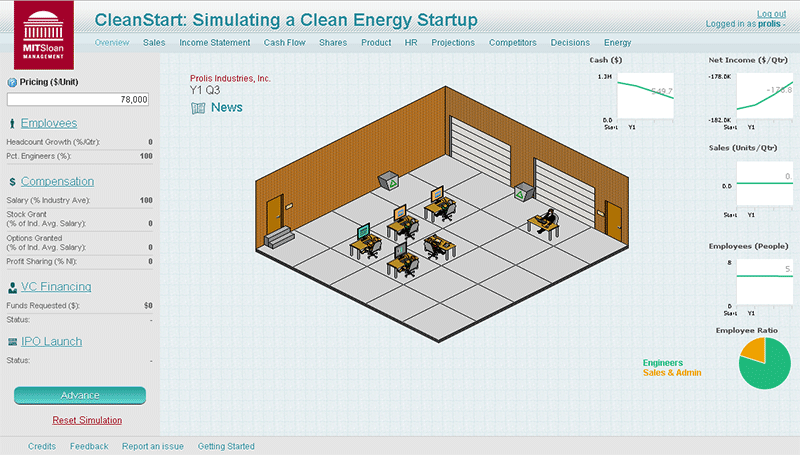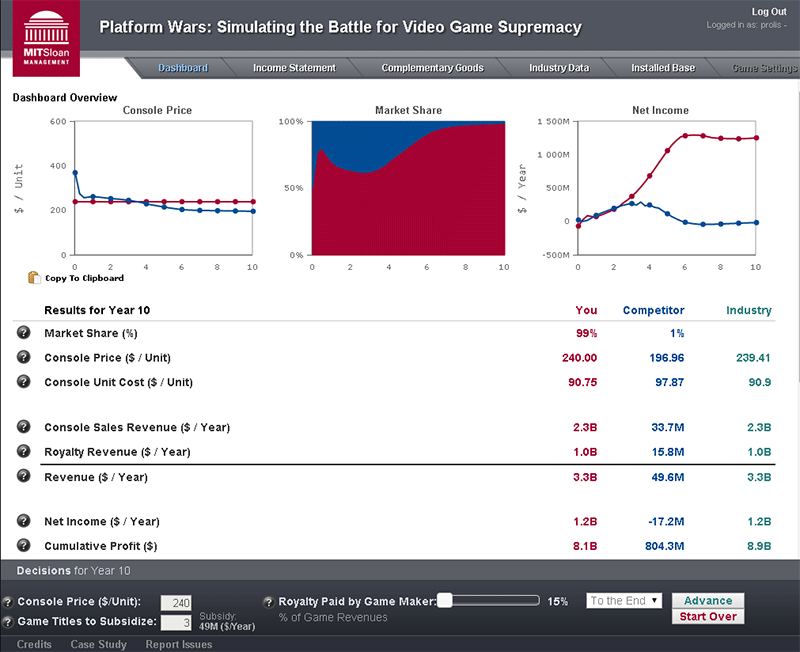3 MIT business simulators: salt sales pricing, development of an ecological startup, dominance of a gaming platform
We continue to study and share interesting simulators and business games. This review presents the educational products of MIT Sloan School of Management: Salt Seller, Clean Start, and Platform Wars.

MIT Sloan offers the latest knowledge sharing innovation LearningEdge , a free educational resource for educators and students in management. One of the learning tools are business management games. Each business simulator contains video tutorials and online tutorials.
The game imitates the processes of the salt industry using the example of Compass Minerals International. In order not to complicate the learning process, the developers abstracted from the features of Compass and other companies, focusing only on price competition between two identical companies. Despite the fact that the model has been carefully tuned and tested, it is not intended for forecasting purposes. Rather, it is used to illustrate the importance of integrated dynamics not only in the salt industry, but also in other situations where one may encounter it.
Your task is to maximize your total income in the long run. You and the competitor both choose the price and sell salt to customers every year. You will receive feedback in the form of indicators of the stock market, income, profit, expenses, etc. You must choose your pricing strategy based on your judgments about the response of your competitor and customers.

Game Page: Salt Seller: A Commodity Pricing Simulation
Your company has developed a set of technologies to improve the energy efficiency of commercial and industrial buildings. Your product consists of sensors, controllers and software that integrate the existing heating, ventilation and air conditioning control system in the building to optimize energy efficiency, thereby reducing greenhouse gas emissions and saving money.
In your business model, revenue consists of initial sales of products and annual subscription fees. You set the price of dashboards and a monthly fee of 5 percent per year of the sale price. Initially, your product costs $ 60,000 for production and installation, but you expect these costs to fall as you learn and increase profits from improving products and processes. Despite the fact that you think that your product provides good benefits, building owners and managers are conservative and many are not aware of the potential savings from this type of product.

Game page: CleanStart: Simulating a Clean Energy Startup
In this game, participants act as top executives of a video game hardware platform manufacturer such as Sony, Nintendo, or Microsoft. Built around a case study describing the launch of the Sony PlayStation 3, simulation explores the dynamics of competition in multilateral markets. In such markets, success depends not only on the price and features of the product, but also on how many people own it on the number of available games and applications on the platform.
In the simulator, you control the following parameters: the retail price of the game console, the annual subsidies for video games and the percentage of royalties for game developers. The game can be used for training in the following educational courses: strategy, economics, technical strategy, system dynamics (mathematical modeling), or any course where the dynamics of strategic pricing management is studied.

Game page: Platform Wars: Simulating the Battle for Video Game Supremacy
Full review of business simulations on our website.

MIT Sloan offers the latest knowledge sharing innovation LearningEdge , a free educational resource for educators and students in management. One of the learning tools are business management games. Each business simulator contains video tutorials and online tutorials.
Salt Seller: Selling Sales Pricing
The game imitates the processes of the salt industry using the example of Compass Minerals International. In order not to complicate the learning process, the developers abstracted from the features of Compass and other companies, focusing only on price competition between two identical companies. Despite the fact that the model has been carefully tuned and tested, it is not intended for forecasting purposes. Rather, it is used to illustrate the importance of integrated dynamics not only in the salt industry, but also in other situations where one may encounter it.
Your task is to maximize your total income in the long run. You and the competitor both choose the price and sell salt to customers every year. You will receive feedback in the form of indicators of the stock market, income, profit, expenses, etc. You must choose your pricing strategy based on your judgments about the response of your competitor and customers.

Game Page: Salt Seller: A Commodity Pricing Simulation
CleanStart: Green Energy Startup
Your company has developed a set of technologies to improve the energy efficiency of commercial and industrial buildings. Your product consists of sensors, controllers and software that integrate the existing heating, ventilation and air conditioning control system in the building to optimize energy efficiency, thereby reducing greenhouse gas emissions and saving money.
In your business model, revenue consists of initial sales of products and annual subscription fees. You set the price of dashboards and a monthly fee of 5 percent per year of the sale price. Initially, your product costs $ 60,000 for production and installation, but you expect these costs to fall as you learn and increase profits from improving products and processes. Despite the fact that you think that your product provides good benefits, building owners and managers are conservative and many are not aware of the potential savings from this type of product.

Game page: CleanStart: Simulating a Clean Energy Startup
Platform Wars: The Battle for Video Game Superiority
In this game, participants act as top executives of a video game hardware platform manufacturer such as Sony, Nintendo, or Microsoft. Built around a case study describing the launch of the Sony PlayStation 3, simulation explores the dynamics of competition in multilateral markets. In such markets, success depends not only on the price and features of the product, but also on how many people own it on the number of available games and applications on the platform.
In the simulator, you control the following parameters: the retail price of the game console, the annual subsidies for video games and the percentage of royalties for game developers. The game can be used for training in the following educational courses: strategy, economics, technical strategy, system dynamics (mathematical modeling), or any course where the dynamics of strategic pricing management is studied.

Game page: Platform Wars: Simulating the Battle for Video Game Supremacy
Full review of business simulations on our website.
